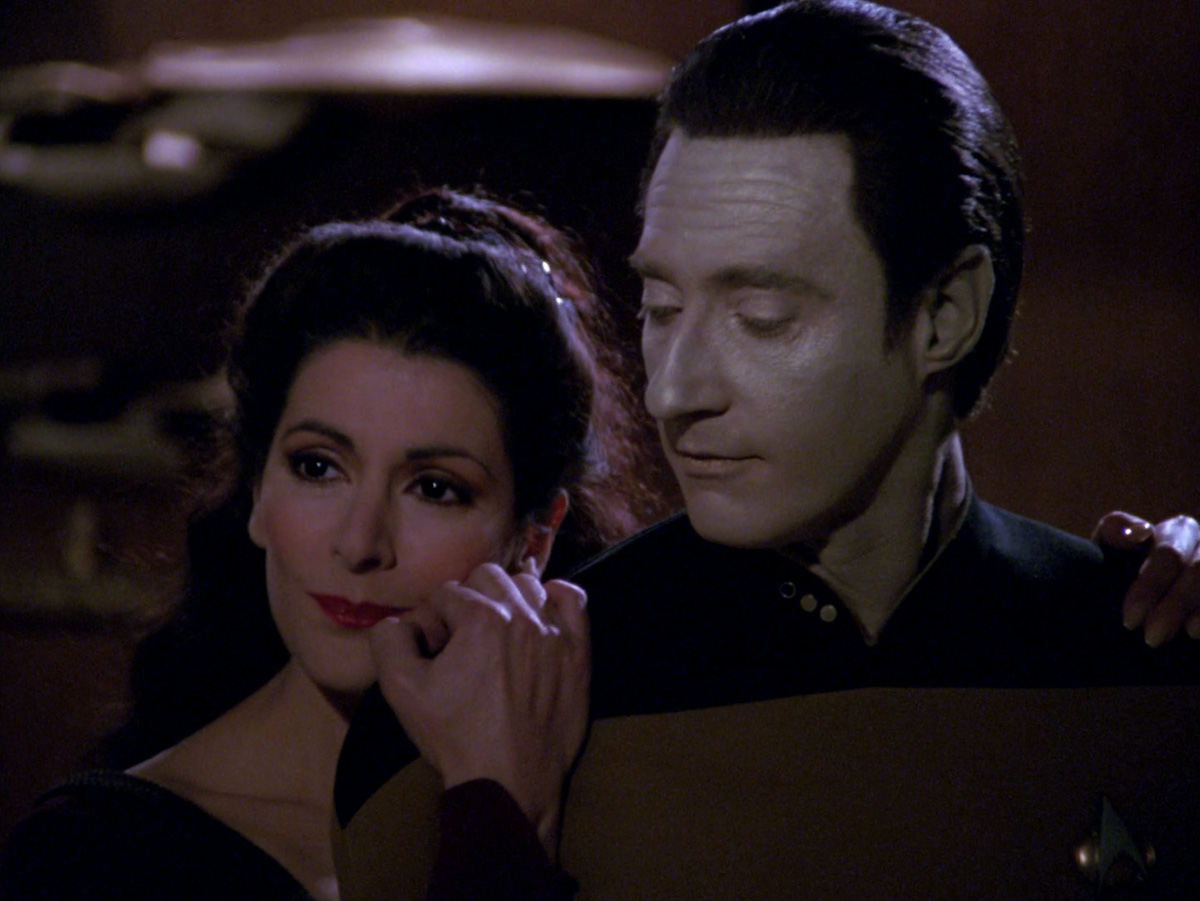“Is that the purpose of existence? To care for someone?”
“Tin Man” is probably best remembered in fan circles for its rather extraordinary musical score, which was Jay Chattaway’s first composition for Star Trek: The Next Generation and is such a verdant explosion of orchestral emotion that it probably gave Rick Berman a heart attack. Chattaway never wrote anything like it afterwards – in fact, his tenure on Next Gen and Voyager was one of the least musically interesting of the cadre of composers – but “Tin Man” is a stunner. From the bombastic “CHARGE!” of the Enterprise’s various confrontations with the Romulans throughout the episode, to the lonely pipe whistle that both serves as Tin Man’s prevailing motif and, near-diegetically, a kind of spaceborne whale song for the creature itself, “Tin Man” is as unique a piece of Star Trek music as was ever composed.
The episode’s really good, too, which is unsurprising given the string of successes in Next Gen’s third season into which it handily falls. We’re given another keen guest performance, this time by Harry Groener (the Mayor from Buffy, before he was the Mayor from Buffy) as nearly-insane Betazoid first contact specialist Tam Elbrun. Tam was born with his telepathic skills “switched on” and is thereby condemned to spend his days wandering through a sea of empathic emotion that he’s never developed the walls to keep out. My viewing of “Tin Man” coincided nicely with my reading A General Theory of Love, and thinking about the limbic development of child minds in the first few years of life got me thinking a lot about how our own innate empathic sense in those first few years threatens to nearly turn us all into a bunch of Tam Elbruns ourselves. Feeling what those around us feel, behaving as those around us behave, writing our lifelong personalities in perilously wet cement with little or no control of the process… the formation of personality is a terrifying idea to contemplate.
Not unlike “The Hunted,” “Tin Man” finds a lot of strength in pairing the guest character with Data and Troi. Deanna has a friendship with Elbrun from her days as a student, and Data is a relief to the empathy because he has no readable thoughts; but regardless of how you get there, Data and Troi do make a rather lovely combination on Next Gen, one which is rarely talked about. As I’ve mentioned previously, Data is the crew member which, theoretically, Counselor Troi would have the littlest overall to do with – her stock in trade are feelings, and he has none; but the two characters have a wonderfully sweet friendship, as evidenced here and in episodes like “The Offspring” and “The Schizoid Man,” which allows “Tin Man” to land its final scene with surprising emotional resonance. “This is where I belong,” Data admits after being transported back to the Enterprise by the departing Tin Man. There’s a line from earlier in the episode, from Tam, which suggests that there was a time in her life when Deanna had trouble fitting in, too, only to find herself finally belonging on this ship of fools of which we are so fond. It’s a lovely scene.
Some miscellany:
- Riker remains the wedge in any writing scenario in which a wedge is needed, apparently – here, the script needs him to be a hate-filled idiot, and Frakes gamely obliges;
- The groaning interior sounds of Tin Man were created, as I recall, by having one of the sound guys eat an entire pizza, and then recording his stomach;
- and Data – for reasons undisclosed – seems to be painting the time vortex from “Time Squared” in his spare time in his quarters!

Blogging The Next Generation runs every Tuesday as I work my way through every episode of Star Trek: The Next Generation on blu-ray. Season Four is in stores today.
